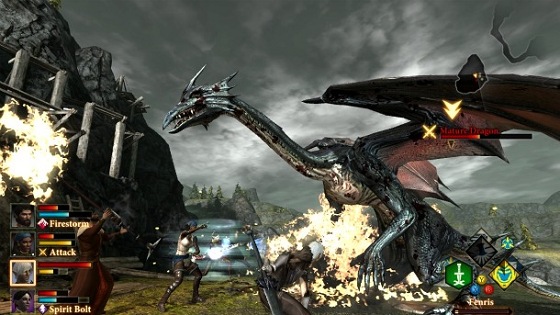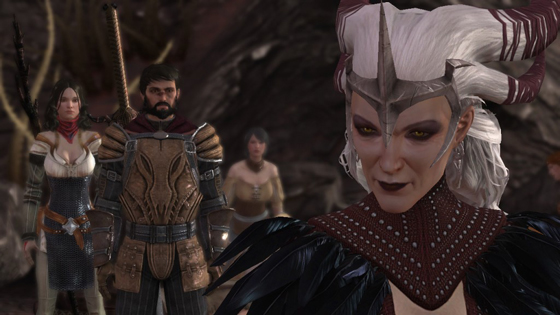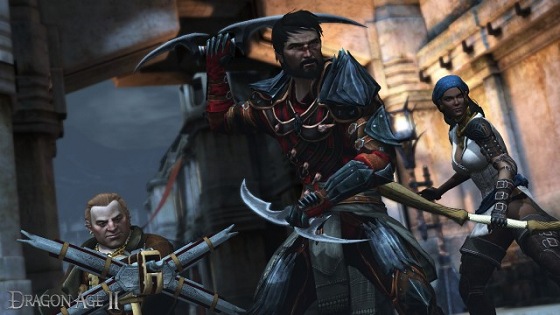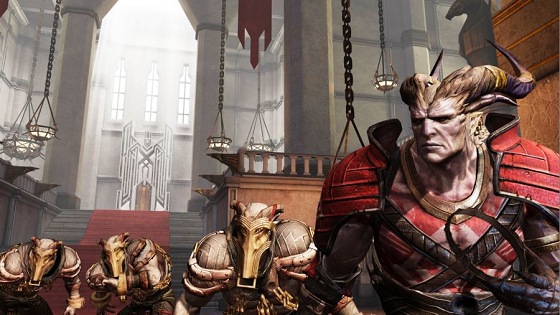
I've never played Dragon Age: Origins or it's spiritual predecessor, Baldur's Gate, but for whatever reason, I felt genuinely compelled to play Dragon Age II. In situations like this, I would go back and play the previous titles to get up to speed, but in this case, time wouldn't allow it. To offset my lack of series experience, I've watched a friend play through some of Origins. I've also recruited a rogue with many years of role playing game experience, and a specialization in Dragon Age, as an advisor. We'll call her Snake. Would my party find BioWare's latest suitable for Kirkwall's history books, or would it suffer the fate of a Darkspawn?
Overview
In Dragon Age II you control of Hawke, a survivor of the Ferelden Blight who builds his (or her) way up from an outcast in the town of Kirkwall to become the city's champion in a span of over a decade. Dragon Age: Origins was a finely crafted tale of dragons and demons forged over many years from the still warm remains of a PC gaming classic. The sequel is an 18 month rush job, surely created to capitalize of the success of its origins.
Snake's Take: I think they actually alienated a lot of the Dragon Age fanbase, the ones who played it because it was a tribute to old role playing games.

Gameplay
As a rogue, I spent much of my time in battle button mashing the default attack. I'm actually a bit relieved I decided to play as a rogue, since they can be spec'd strongly with many passive abilities. This is especially helpful playing on a console, since console players are limited to six talents on the fly. Anything other than the specified six needs to be activated from the ability wheel, which pauses the action and requires a few thumbstrokes, eating precious time which could be better spent slaying. Regardless, battles were pretty fun. Of note, the ability to pan the camera tactically from Dragon Age: Origins is out the window. This time around, the camera is stuck behind the character you're in control of at that moment. Want to survey the battlefield? Too bad.
Snake's Take: I can't stand that enemies appear out of thin air. I can't use strategy, it doesn't matter where I position people when enemies can appear out of the wall. I'm playing Origins on Nightmare, it's easy if you know what you're doing. I die a lot more in Dragon Age II because I can't position my players, and can't micromanage them as well.
The framed narrative - a story within a story - that was hyped pre-release is on display throughout. What it does is seemingly skip entire gaps of story at a time, leaving little but cliffnotes to fill in the blanks. It also shifts the focus of the story on multiple occasions, making it more of an effort than it should be to focus on the meat and potatoes. What should be a story in three acts becomes a bit of a shuffled mess when it's all said and done. Through my time spent with Dragon Age II, I didn't find myself bonding with any protagonist or antagonist, except maybe Varric, because it's hard not to love a smooth dwarf. The connections of character to character, as well as that of character to player just seemed weak. I don't even think the Hawke family cares when one of their own is slaughtered.

Like Mass Effect 2 did its birthright, Dragon Age 2 dumbs down the experience that was offered the first time around. Though Mass Effect 2 did it gracefully -- paring down elements of the RPG aesthetic, but continuing to deliver an involving and enjoyable experience -- Dragon Age 2 has nerfed itself to another extent. I wonder if the target audience are first timers to the role playing genre? This point is validated by way of several design choices.
Snake's Take: The more I play, the more I see Mass Effect, except I'd rather play Mass Effect, than Dragon Age disguised as Mass Effect.
For instance, the ability to choose only three classes, with specialization trees to create versatile jack of all frankensteins. Rogues who tank, mages who heal, et al. Companion balance is incredibly off. I played a rogue, and at game's end I was stuck with 3 mages, two other rogues, and one warrior. Which means no matter how much my choices clashed with those of my warrior, I was stuck with her, hating my every decision, if I wanted a traditional tank in the party. NOTE: I did not find the other warrior option, who was buried away in a side quest.
Snake's Take: Side quests, wtf? I don't even know what I'm doing, I just go to where the arrows point me on the map.
The morality system, what seems to be a staple in gaming today, has been rolled back to a companion approval system of sorts. No matter how much my actions bothered my lone warrior, she stuck with me as long as I kept putting her in my party. Pissing her off to an "unfriendly" state even unlocks an ability that would otherwise be inaccessible, because my enemies always use their hidden talents for my benefit, right?

Art Design
The art is a bit of a bore. Though the character models are quite nice, the locales of Kirkwall and its immediate outskirts never caught my eye or imagination. Armor options are ugly, as are most of the weapons I came across. The only armor I was proud to wear, as a rogue, was the Champion's armor, which as arguably the best set in the game, better look good. The inability to equip gear on your supporting characters makes them all appear stale after a while, even if their armor upgrades tweaks their look slightly. Unfortunately, slightly isn't fresh enough,
Navigation of the world is cut down to a 'town map' similar to the choose-your-destination mechanic of Mass Effect's star map, except that actually made sense because your crew was traversing between solar systems. Instantly moving -- loosely, let's not forget the hefty load times -- from area to area within just one city seems like a bit of a cop out. I wouldn't mind that as an option, but as the only choice, it's sad. Didn't RPGs used to be about exploration? Dungeons seem to be limited to the same areas over and over, and even if you find two unique caves to explore, odds are the interiors are laid out exactly the same. When this happened to me, I had sworn I lost my mind. Yet no, I had just fallen victim to the magicks of the lazy devs.
The default Hawke is a sexy beast of either gender, but my created Hawke couldn't quite nail the look I was going for. It was especially frustrating to see certain facial features reset to default for no reason I could comprehend. My sunken-cheeked, gaunt vision of assassin death looked more often like a chipmunk preparing for winter, because his facial sliders kept resetting for some reason. Not gangsta.

Audio Design
The music is an afterthought. I can't even recall enough to tell you of it. The voices are pretty well done, even if they get a bit annoying after a while (I'm looking at you Hawke). I especially liked the mid-combat banter between my rogue Hawke and fellow rogue Varric, making a game of keeping bodycount. The inclusion of Gideon Emery, a favorite of mine since his work as Final Fantasy XII's Balthier is another bonus. However, voice acting alone does not save Dragon Age II.
Conclusion
Between critical and commercial reception, negative press, and developers attempting to give their own game positive reviews, Dragon Age II has had a rough go of it. As much as I was looking forward to this, it fails to live up to the strong standards of Origins, set by press, friends, and Snake herself. A story full of holes and a cast of characters that makes a sloth look like a slapstick comedian does not help Dragon Age II's cause. If BioWare treated this as more of a proper sequel, and spent time fleshing out the story and creating interesting tales for the entire cast, Dragon Age II may have been able to live up to Dragon Age: Origins. By no means is the game awful, as evidenced by the fact that I kept coming back to play it, but it certainly feels like it was rushed out the door.
Buy it if: You need a new RPG, you're a fan of the Dragon Age series
Don't buy it if: Strong characters and story are important to you
The Score: 6 outta 10 blasters!